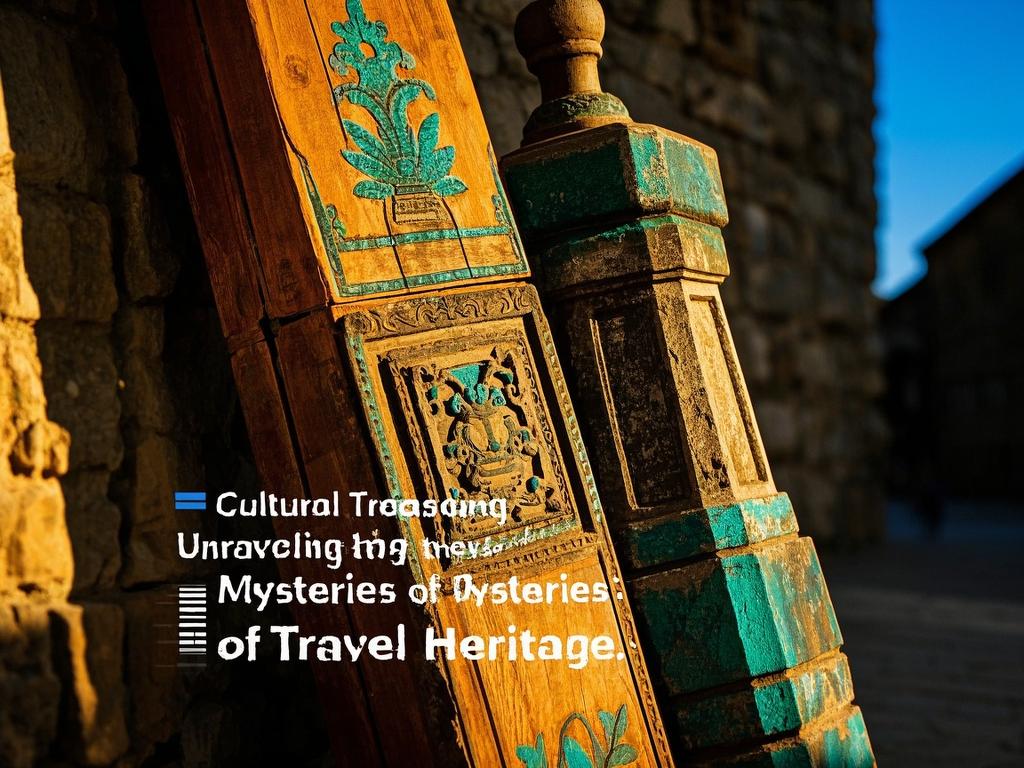
# Cultural Treasures: Unraveling the Mysteries of Travel Heritage
Hey there, fellow adventurers! Are you ready to embark on a journey like no other? A journey that will take you through time and across cultures, uncovering the hidden gems of our world's rich travel heritage. Well, hold on tight because I'm about to be your trusty guide on this exhilarating expedition!
Let's start by diving into the depths of history. Travel heritage is like a living, breathing tapestry woven with the threads of countless civilizations. From the ancient Silk Road that connected East and West, allowing the exchange of goods, ideas, and cultures, to the grandeur of the Roman Empire's extensive road networks that facilitated trade and conquest. These historical arteries not only shaped the course of human history but also left behind a legacy of remarkable architectural wonders and cultural traditions.
Take, for instance, the Great Wall of China. Standing tall and proud, this colossal structure is not just a physical barrier but a symbol of resilience and human achievement. As you walk along its ancient bricks, you can almost feel the echoes of centuries past, the stories of soldiers defending their homeland, and the merchants plying their trade along its routes. It's a sight that will leave you in awe, a testament to the ingenuity and determination of our ancestors.
And then there's the Acropolis in Athens, Greece. This ancient citadel is a masterpiece of classical architecture, housing some of the most iconic buildings in the world, such as the Parthenon. As you wander through its ruins, you'll be transported back to a time of great philosophical thinkers, artists, and warriors. The Acropolis is not just a historical site; it's a cultural treasure trove that continues to inspire and captivate people from all over the globe.
But travel heritage isn't just about ancient ruins and historical landmarks. It's also about the intangible cultural practices that have been passed down through generations. Think about the vibrant festivals that celebrate different cultures around the world. From the colorful carnivals of Rio de Janeiro to the solemn rituals of the Japanese cherry blossom festivals, these events are a kaleidoscope of sights, sounds, and flavors that offer a glimpse into the heart and soul of a community.
One of my personal favorites is the Day of the Dead in Mexico. This annual celebration is a time to honor and remember loved ones who have passed away. The streets come alive with elaborate altars decorated with marigolds, sugar skulls, and photos of the deceased. People dress up in traditional costumes, parade through the streets, and share food and drinks with family and friends. It's a celebration of life and death, a reminder that even in the face of loss, there is always hope and joy to be found.
Another aspect of travel heritage that often goes unnoticed is the culinary traditions of different regions. Food is not just fuel; it's a cultural expression, a way of telling stories about a place and its people. From the spicy curries of India to the delicate pastries of France, each dish has a unique history and flavor profile that reflects the local culture and traditions.
Imagine sitting in a cozy trattoria in Italy, savoring a plate of homemade pasta cooked to perfection, with a rich tomato sauce and a sprinkle of freshly grated Parmesan cheese. Or perhaps enjoying a mouthwatering sushi roll in Japan, with its fresh ingredients and precise presentation. Food is a universal language that brings people together, and exploring the culinary heritage of different destinations is a delicious way to immerse yourself in a new culture.
So, why is travel heritage so important? Well, for starters, it helps us understand our past and the diverse cultures that have shaped our world. It allows us to connect with our roots and appreciate the achievements of our ancestors. By preserving and protecting these cultural treasures, we ensure that future generations will have the opportunity to experience the same wonder and inspiration that we do today.
But travel heritage also has a profound impact on our present. It promotes cultural exchange and understanding, breaking down barriers and building bridges between different communities. When we travel to new places and learn about their traditions and customs, we gain a greater appreciation for the diversity of human experience. This, in turn, helps us become more open-minded, tolerant, and empathetic individuals.
And let's not forget about the economic benefits of travel heritage. Tourism is one of the largest industries in the world, and cultural tourism, in particular, plays a crucial role in boosting local economies. By attracting visitors to historical sites, cultural festivals, and traditional events, we create jobs, generate income, and support local businesses. This, in turn, helps to preserve and revitalize these cultural treasures for future generations.
So, what are you waiting for? It's time to start planning your next adventure and uncover the mysteries of travel heritage for yourself. Whether you're a history buff, a culture vulture, or just someone who loves to explore new places, there's something out there for everyone.
So, pack your bags, grab your passport, and get ready to embark on a journey of a lifetime. I promise you, it will be an adventure you'll never forget! And who knows, maybe along the way, you'll discover a new passion, a new culture, or a new perspective on life. The world is waiting for you to explore it, so what are you waiting for? Let's go!

